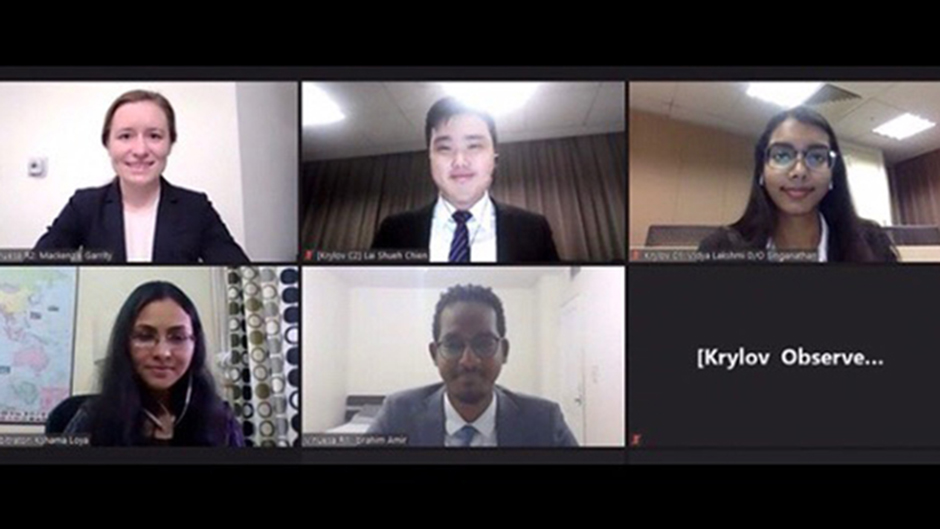Preparing for an international moot court competition is demanding enough in a typical year. Participants at Miami Law – the only International Moot Court Program in the United States – must dedicate several days a week to extensive research, writing, and practice rounds over several months. The COVID-19 pandemic added a whole other dimension to the challenge, forcing students to adapt to a fully digital medium for practice rounds and oral arguments.
Fortunately, Miami Law’s team — comprised of Mackenzie Garrity, 3L; Ana Sarmento, LL.M.; and Ibrahim Amir, J.D./LL.M. — was more than up for the task for the 2020 Foreign Direct Investment Moot Competition. Following back-to-back final rounds from November 4 through 9, which were conducted virtually from Seoul, South Korea, the team placed fifth out of 77 teams and received the second highest oralist scores. Out of 242 individual oralists, both Garrity and Sarmento ranked among the top ten, at fourth and sixth.
“After competing in a different international moot court competition last year, I knew I wanted to participate in the program again,” said Garrity, who is also president of IMCP. “Competing in the FDI competition allowed me to further improve my advocacy skills under the unmatched guidance of Professor Arias. She brought together me, Ana, and Ibrahim months ago, and we worked together remotely all summer, brainstorming legal arguments and finetuning our competition strategy.”
Paula Arias is the director of the program, as well as lecturer-in-law at Miami Law. She is known for her hands-on approach to prepping each team, including providing individualized coaching. In addition to marking the first time that every competition was conducted virtually, 2020 is also the tenth anniversary of IMCP’s founding.
Both Arias and her students were determined not to let the disruption of the pandemic get in the way of representing Miami Law to the global legal community.
“Because of the pandemic, the first time we actually met in person as a team was on the first day of the competition,” added Garrity. “But that didn't stop us from working well together from start to finish.”
The FDI Moot is the world’s leading moot court competition on investor-state disputes, which constitute a rapidly growing area of law. Students are given a hypothetical case that requires extensive knowledge of international dispute resolution, business law, treaty law, corporate structures, and more. The competition spans approximately six months each year in two phases, written memorials for claimant and respondent and the hearing of oral arguments within regional or national rounds, including in Seoul, Korea; New Delhi, India; and Nairobi, Kenya. There are also a series of pre moots in Budapest, Hungary; St Petersburg, Russia; Sao Paulo, Brazil; and Warsaw, Poland, that allow students to polish their arguments in a competitive and high-pressure setting.
The rise of globalization and international investment has made the FDI Moot of considerable interest to attorneys, arbitrators, and legal scholars worldwide, putting Miami Law front and center to the international legal community. Most importantly, it gives students a chance to gain valuable insight into increasingly relevant legal fields and to gain crucial skills along the way.
“The FDI Moot taught me more about advocacy and teamwork than any class ever could,” says Brazilain Sarmento, who is in the International Arbitration LL.M. Program. “The competition demanded hours of research, drafting, discussion, and oral argument practice. I was amazed by the talent and work ethic of my teammates, Mackenzie and Ibrahim, and by Paula Arias’s commitment to our success. My teammates and I were juggling other important commitments, but we never failed each other or our coach.”
The awards were hard-earned, following months of preparation, back-to-back practice rounds, and pre-moots on many early weekend mornings. Because the team could not travel to Seoul, they had to start most of their final rounds as early as 4:00 a.m. The final round was argued and completed amid Tropical Storm Eta — a fitting symbol of the resilience and perseverance that characterizes International Moot Court Program.
Read more about the International Moot Court Program
More on Litigation, Arbitration and Dispute Resolution Programs at Miami Law

